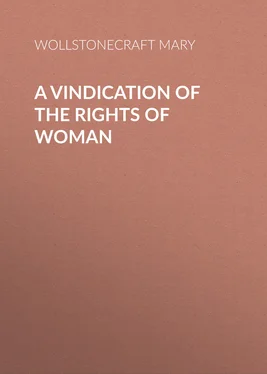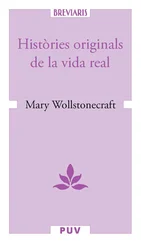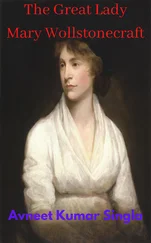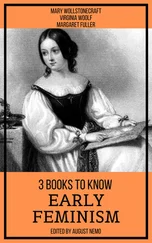Mary Wollstonecraft - A Vindication of the Rights of Woman
Здесь есть возможность читать онлайн «Mary Wollstonecraft - A Vindication of the Rights of Woman» — ознакомительный отрывок электронной книги совершенно бесплатно, а после прочтения отрывка купить полную версию. В некоторых случаях можно слушать аудио, скачать через торрент в формате fb2 и присутствует краткое содержание. Жанр: foreign_prose, История, literature_18, foreign_edu, foreign_antique, на английском языке. Описание произведения, (предисловие) а так же отзывы посетителей доступны на портале библиотеки ЛибКат.
- Название:A Vindication of the Rights of Woman
- Автор:
- Жанр:
- Год:неизвестен
- ISBN:нет данных
- Рейтинг книги:4 / 5. Голосов: 1
-
Избранное:Добавить в избранное
- Отзывы:
-
Ваша оценка:
- 80
- 1
- 2
- 3
- 4
- 5
A Vindication of the Rights of Woman: краткое содержание, описание и аннотация
Предлагаем к чтению аннотацию, описание, краткое содержание или предисловие (зависит от того, что написал сам автор книги «A Vindication of the Rights of Woman»). Если вы не нашли необходимую информацию о книге — напишите в комментариях, мы постараемся отыскать её.
A Vindication of the Rights of Woman — читать онлайн ознакомительный отрывок
Ниже представлен текст книги, разбитый по страницам. Система сохранения места последней прочитанной страницы, позволяет с удобством читать онлайн бесплатно книгу «A Vindication of the Rights of Woman», без необходимости каждый раз заново искать на чём Вы остановились. Поставьте закладку, и сможете в любой момент перейти на страницу, на которой закончили чтение.
Интервал:
Закладка:
Mary Wollstonecraft
A Vindication of the Rights of Woman / With Strictures on Political and Moral Subjects
A BRIEF SKETCH OF THE LIFE OF MARY WOLLSTONECRAFT
M. Wollstonecraft was born in 1759. Her father was so great a wanderer, that the place of her birth is uncertain; she supposed, however, it was London, or Epping Forest: at the latter place she spent the first five years of her life. In early youth she exhibited traces of exquisite sensibility, soundness of understanding, and decision of character; but her father being a despot in his family, and her mother one of his subjects, Mary, derived little benefit from their parental training. She received no literary instructions but such as were to be had in ordinary day schools. Before her sixteenth year she became acquainted with Mr. Clare a clergyman, and Miss Frances Blood; the latter, two years older than herself; who possessing good taste and some knowledge of the fine arts, seems to have given the first impulse to the formation of her character. At the age of nineteen, she left her parents, and resided with a Mrs. Dawson for two years; when she returned to the parental roof to give attention to her mother, whose ill health made her presence necessary. On the death of her mother, Mary bade a final adieu to her father's house, and became the inmate of F. Blood; thus situated, their intimacy increased, and a strong attachment was reciprocated. In 1783 she commenced a day school at Newington green, in conjunction with her friend, F. Blood. At this place she became acquainted with Dr. Price, to whom she became strongly attached; the regard was mutual.
It is said that she became a teacher from motives of benevolence, or rather philanthropy, and during the time she continued in the profession, she gave proof of superior qualification for the performance of its arduous and important duties. Her friend and coadjutor married and removed to Lisbon, in Portugal, where she died of a pulmonary disease; the symptoms of which were visible before her marriage. So true was Mary's attachment to her, that she entrusted her school to the care of others, for the purpose of attending Frances in her closing scene. She aided, as did Dr. Young, in "Stealing Narcissa a grave." Her mind was expanded by this residence in a foreign country, and though clear of religious bigotry before, she took some instructive lessons on the evils of superstition, and intolerance.
On her return she found the school had suffered by her absence, and having previously decided to apply herself to literature, she now resolved to commence. In 1787 she made, or received, proposals from Johnson, a publisher in London, who was already acquainted with her talents as an author. During the three subsequent years, she was actively engaged, more in translating, condensing, and compiling, than in the production of original works. At this time she laboured under much depression of spirits, for the loss of her friend; this rather increased, perhaps, by the publication of "Mary, a novel," which was mostly composed of incidents and reflections connected with their intimacy.
The pecuniary concerns of her father becoming embarrassed, Mary practised a rigid economy in her expenditures, and with her savings was enabled to procure her sisters and brothers situations, to which without her aid, they could not have had access; her father was sustained at length from her funds; she even found means to take under her protection an orphan child.
She had acquired a facility in the arrangement and expression of thoughts, in her avocation of translator, and compiler, which was no doubt of great use to her afterward. It was not long until she had occasion for them. The eminent Burke produced his celebrated "Reflections on the Revolution in France." Mary full of sentiments of liberty, and indignant at what she thought subversive of it, seized her pen and produced the first attack upon that famous work. It succeeded well, for though intemperate and contemptuous, it was vehemently and impetuously eloquent; and though Burke was beloved by the enlightened friends of freedom, they were dissatisfied and disgusted with what they deemed an outrage upon it.
It is said that Mary, had not wanted confidence in her own powers before, but the reception this work met from the public, gave her an opportunity of judging what those powers were, in the estimation of others. It was shortly after this, that she commenced the work to which these remarks are prefixed. What are its merits will be decided in the judgment of each reader; suffice it to say she appears to have stept forth boldly, and singly, in defence of that half of the human race, which by the usages of all society, whether savage or civilized, have been kept from attaining their proper dignity—their equal rank as rational beings. It would appear that the disguise used in placing on woman the silken fetters which bribed her into endurance, and even love of slavery, but increased the opposition of our authoress: she would have had more patience with rude, brute coercion, than with that imposing gallantry, which, while it affects to consider woman as the pride, and ornament of creation, degrades her to a toy—an appendage—a cypher. The work was much reprehended, and as might well be expected, found its greatest enemies in the pretty soft creatures—the spoiled children of her own sex. She accomplished it in six weeks.
In 1792 she removed to Paris, where she became acquainted with Gilbert Imlay, of the United States. And from this acquaintance grew an attachment, which brought the parties together, without legal formalities, to which she objected on account of some family embarrassments, in which he would thereby become involved. The engagement was however considered by her of the most sacred nature, and they formed the plan of emigrating to America, where they should be enabled to accomplish it. These were the days of Robespierrean cruelty, and Imlay left Paris for Havre, whither after a time Mary followed him. They continued to reside there, until he left Havre for London, under pretence of business, and with a promise of rejoining her soon at Paris, which however he did not, but in 1795 sent for her to London. In the mean time she had become the mother of a female child, whom she called Frances in commemoration of her early friendship.
Before she went to England, she had some gloomy forebodings that the affections of Imlay, had waned, if they were not estranged from her; on her arrival, those forebodings were sorrowfully confirmed. His attentions were too formal and constrained to pass unobserved by her penetration, and though he ascribed his manner, and his absence, to business duties, she saw his affection for her was only something to be remembered. To use her own expression, "Love, dear delusion! Rigorous reason has forced me to resign; and now my rational prospects are blasted, just as I have learned to be contented with rational enjoyments." To pretend to depict her misery at this time would be futile; the best idea can be formed of it from the fact that she had planned her own destruction, from which Imlay prevented her. She conceived the idea of suicide a second time, and threw herself into the Thames; she remained in the water, until consciousness forsook her, but she was taken up and resuscitated. After divers attempts to revive the affections of Imlay, with sundry explanations and professions on his part, through the lapse of two years, she resolved finally to forgo all hope of reclaiming him, and endeavour to think of him no more in connexion with her future prospects. In this she succeeded so well, that she afterwards had a private interview with him, which did not produce any painful emotions.
In 1796 she revived or improved an acquaintance which commenced years before with Wm. Godwin, author of "Political Justice," and other works of great notoriety. Though they had not been favourably impressed with each other on their former acquaintance, they now met under circumstances which permitted a mutual and just appreciation of character. Their intimacy increased by regular and almost imperceptible degrees. The partiality they conceived for each other was, according to her biographer, "In the most refined style of love. It grew with equal advances in the mind of each. It would have been impossible for the most minute observer to have said who was before, or who after. One sex did not take the priority which long established custom has awarded it, nor the other overstep that delicacy which is so severely imposed. Neither party could assume to have been the agent or the patient, the toil-spreader or the prey in the affair. When in the course of things the disclosure came, there was nothing in a manner for either to disclose to the other."
Читать дальшеИнтервал:
Закладка:
Похожие книги на «A Vindication of the Rights of Woman»
Представляем Вашему вниманию похожие книги на «A Vindication of the Rights of Woman» списком для выбора. Мы отобрали схожую по названию и смыслу литературу в надежде предоставить читателям больше вариантов отыскать новые, интересные, ещё непрочитанные произведения.
Обсуждение, отзывы о книге «A Vindication of the Rights of Woman» и просто собственные мнения читателей. Оставьте ваши комментарии, напишите, что Вы думаете о произведении, его смысле или главных героях. Укажите что конкретно понравилось, а что нет, и почему Вы так считаете.












